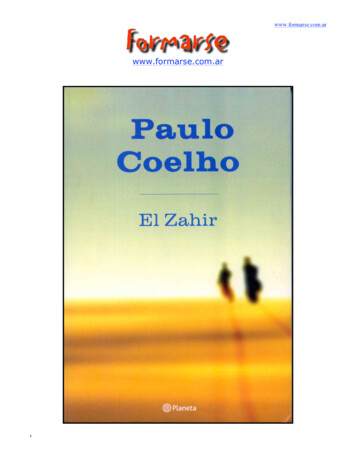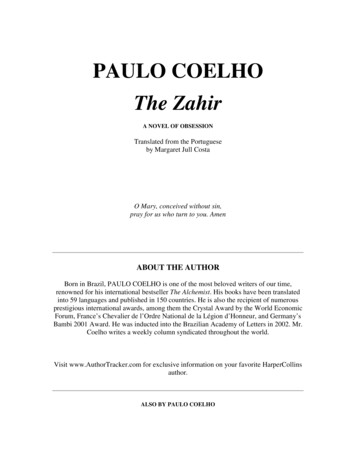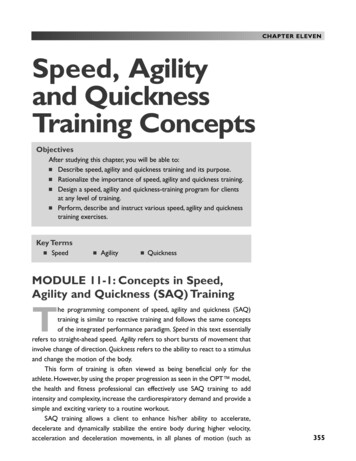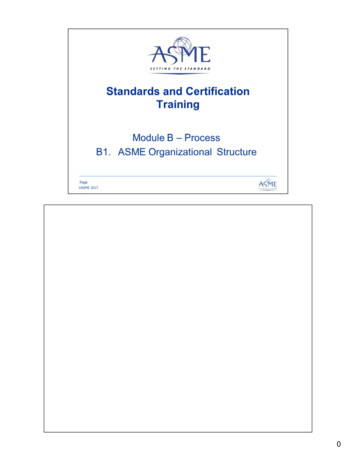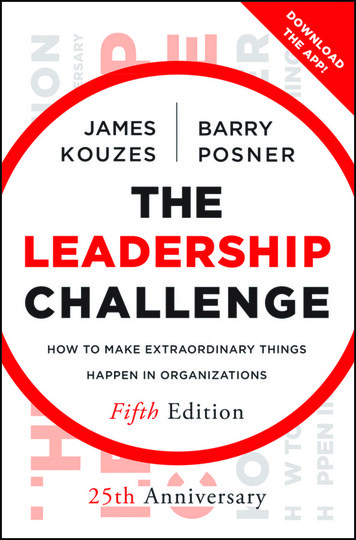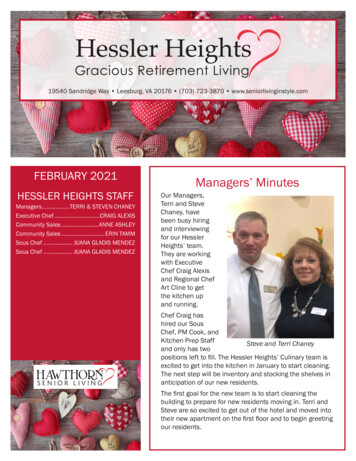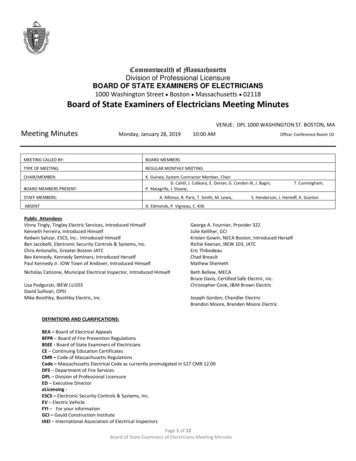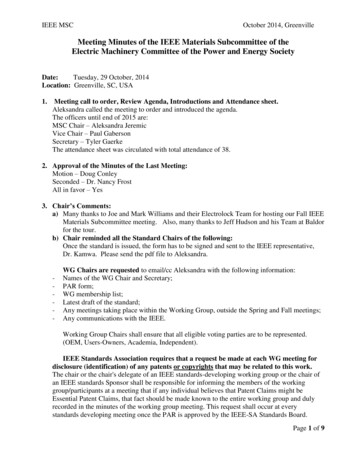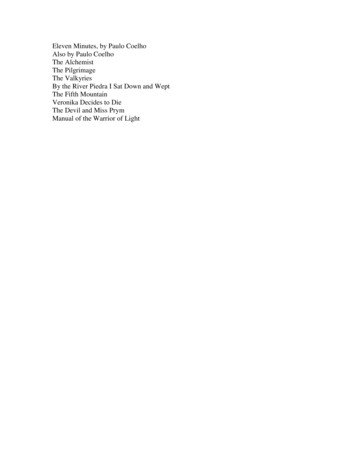
Transcription
Eleven Minutes, by Paulo CoelhoAlso by Paulo CoelhoThe AlchemistThe PilgrimageThe ValkyriesBy the River Piedra I Sat Down and WeptThe Fifth MountainVeronika Decides to DieThe Devil and Miss PrymManual of the Warrior of Light
ELEVEN MINUTESTRANSLATED FROM THE PORTUGUESEBY MARGARET JULL COSTA4uHarperCollins Publishers
HarperCollinsPublishers77-85 Fulham Palace Road,Hammersmith, London w6 8jbThe HarperCollins website address is: www.harpercollins.co.ukPaulo Coelho's website address is: www.paulocoelho.comFirst published in English by HarperCollinsPublishers 200313579 10 8642 Paulo Coelho 2003Paulo Coelho asserts the moral right to be identified as the author of this workA catalogue record of this book is available from the British LibraryISBN o 00 716604 4Printed and bound in Great Britain by Clays Ltd, St Ives picAll rights reserved. No part of this publication may be reproduced, stored in a retrievalsystem, or transmitted,in any form or by any means, electronic, mechanical,photocopying, recording or otherwise, without the priorwritten permission of the publishers.
O, Mary, conceived without sin, pray for us who turn to you. Amen.
DedicationOn 29th May 2002, just hours before I put the finishing touches to this book, I visited theGrotto in Lourdes, in France, to fill a few bottles with miraculous water from the spring.Inside the Basilica, a gentleman in his seventies said to me: 'You know, you look just likePaulo Coelho.' I said that I was Paulo Coelho. The man embraced me and introduced me to his wife and grand-daughter. He spoke of the importance of my books in hislife, concluding: 'They make me dream.' I have often heard these words before, and theyalways please me greatly. At that moment, however, I felt really frightened, because Iknew that my new novel, Eleven Minutes, dealt with a subject that was harsh, difficult,shocking. I went over to the spring, filled my bottles, then came back and asked himwhere he lived (in northern France, near Belgium) and noted down his name.This book is dedicated to you, Maurice Gravelines. I have a duty to you, your wife andgrand-daughter and to myself to talk about the things that concern me and not only aboutwhat everyone would like to hear. Some books make us dream, others bring us face toface with reality, but what matters most to the author is the honesty with which a book iswritten.
And, behold, a woman which was in the city, a sinner; and when she knew that Jesus wassitting at meat in the Pharisee's house, she brought an alabaster cruse of ointment.And standing behind at his feet, weeping, she began to wet his feet with her tears, andwiped them with the hair of her head, and kissed his feet, and anointed them with theointment.Now when the Pharisee which had bidden him saw it, he spake within himself, saying,This man, if he were a prophet, would have perceived who and what manner of womanthis is which toucheth him, that she is a sinner.And Jesus answering said unto him, Simon, I have somewhat to say unto thee. And hesaith, Master, say on.A certain lender had two debtors: the one owed fivehundred pence, and the other fifty.And when they had not wherewith to pay, he forgave them both. Which of them thereforewill love him most?Simon answered and said, He, I suppose, to whom he forgave the most. And he said untohim, Thou hast rightly judged.And turning to the woman, he said unto Simon, Seest thou this woman? I entered intothine house, thou gavest
Paulo Coelhome no water for my feet; but she hath washed my feet with her tears, and wiped themwith her hair.Thou gavest me no kiss: but she, since the time I came in, hath not ceased to kiss my feet.My head with oil thou didst not anoint: but this she hath anointed my feet with ointment.Wherefore I say unto thee, Her sins, which are many, are forgiven; for she loved much:but to whom little is forgiven, the same loveth little.Luke7''37-47
For I am the first and the lastI am the venerated and the despisedI am the prostitute and the saintI am the wife and the virgin I am the mother and the daughterI am the arms of my motherI am barren and my children are manyI am the married woman and the spinsterI am the woman who gives birth and shewho never procreated I am the consolation for the pain of birthI am the wife and the husbandAnd it was my man who created meI am the mother of my fatherI am the sister of my husbandAnd he is my rejected sonAlways respect me For I am the shameful and the magnificent oneHymn to Isis, third or fourth century BC, discovered in Nag Hammadi
Once upon a time, there was a prostitute called Maria. Wait a minute. 'Once upon a time'is how all the best children's stories begin and 'prostitute' is a word for adults. How can Istart a book with this apparent contradiction? But since, at every moment of our lives, weall have one foot in a fairy tale and the other in the abyss, let's keep that beginning.Once upon a time, there was a prostitute called Maria.Like all prostitutes, she was born both innocent and a virgin, and, as an adolescent, shedreamed of meeting the man of her life (rich, handsome, intelligent), of getting married(in a wedding dress), having two children (who would grow up to be famous) and livingin a lovely house (with a sea view). Her father was a travelling salesman, her mother aseamstress, and her hometown, in the interior of Brazil, had only one cinema, onenightclub and one bank, which was why Maria was always hoping that one day, withoutwarning, her Prince Charming would arrive, sweep her off her feet and take her awaywith him so that they could conquer the world together.While she was waiting for her Prince Charming to appear, all she could do was dream.She fell in love for the first time when she was eleven, en route from her house to
school. On the first day of term, she discovered that she was not alone on her way toschool: making the same journey was a boy who lived in her neighbourhood and whoshared the same timetable. They never exchanged a single word, but gradually Mariabecame aware that, for her, the best part of the day were those moments spent going toschool: moments of dust, thirst and weariness, with the sun beating down, the boywalking fast, and with her trying her hardest to keep up.This scene was repeated month after month; Maria, who hated studying and whose onlyother distraction in life was television, began to wish that the days would pass quickly;she waited eagerly for each journey to school and, unlike other girls her age, she foundthe weekends deadly dull. Given that the hours pass more slowly for a child than for anadult, she suffered greatly and found the days far too long simply because they allowedher only ten minutes to be with the love of her life and thousands of hours to spendthinking about him, imagining how good it would be if they could talk.Then it happened.One morning, on the way to school, the boy came up to her and asked if he could borrowa pencil. Maria didn't reply; in fact, she seemed rather irritated by this unexpectedapproach and even quickened her step. She had felt petrified when she saw him comingtowards her, terrified that he might realise how much she loved him, how eagerly she hadwaited for him, how she had dreamed of taking his hand, of walking straight past theschool gates with him and
continuing along the road to the end, where - people said there was a big city, film starsand television stars, cars, lots of cinemas, and an endless number of fun things to do.For the rest of the day, she couldn't concentrate on her lessons, tormented by her ownabsurd behaviour, but, at the same time, relieved, because she knew that the boy hadnoticed her too, and that the pencil had just been an excuse to start a conversation,because when he came over to her, she had noticed that he already had a pen in hispocket. She waited for the next time, and during that night - and the nights that followed she went over and over what she would say to him, until she found the right way to begina story that would never end.But there was no next time, for although they continued to walk to school together, withMaria sometimes a few steps ahead, clutching a pencil in her right hand, and at othertimes, walking slightly behind him so that she could gaze at him tenderly, he never saidanother word to her, and she had to content herself with loving and suffering in silenceuntil the end of the school year.During the interminable school holidays that followed, she woke up one morning to findthat she had blood on her legs and was convinced she was going to die. She decided toleave a letter for the boy, telling him that he had been the great love of her life, and thenshe would go off into the bush and doubtless be killed by one of the two monsters thatterrorised the country people round about: the werewolf and the mula-sem-cabega (saidto be a priest's mistress transformed into a mule and doomed to wander
the night). That way, her parents wouldn't suffer too much over her death, for, althoughconstantly beset by tragedies, the poor are always hopeful, and her parents wouldpersuade themselves that she had been kidnapped by a wealthy, childless family, butwould return one day, rich and famous, while the current (and eternal) love of her lifewould never forget her, torturing himself each day for not having spoken to her again.She never did write that letter because her mother cameinto the room, saw the bloodstained sheets, smiled and said:'Now you're a young woman.'Maria wondered what the connection was between theblood on her legs and her becoming a young woman, but her mother wasn't able to giveher a satisfactory explanation: she just said that it was normal, and that, from now on, forfour or five days a month, she would have to wear something like a doll's pillow betweenher legs. Maria asked if men used some kind of tube to stop the blood going all over theirtrousers, and was told that this was something that only happened to women.Maria complained to God, but, in the end, she got used to menstruating. She could not,however, get used to the boy's absence, and kept blaming herself for her own stupidity inrunning away from the very thing she most wanted. The day before the new term began,she went to the only church in town and vowed to the image of St Anthony that shewould take the initiative and speak to the boy.The following day, she put on her smartest dress, one that her mother had made speciallyfor the occasion, and
set off to school, thanking God that the holidays had finally ended. But the boy did notappear. And so another agonising week passed, until she found out, through someschoolfriends, that he had left town.'He's gone somewhere far away,' someone said.At that moment, Maria learned that certain things are lost forever. She learned too thatthere was a place called 'somewhere far away', that the world was vast and her own townvery small, and that, in the end, the most interesting people always leave. She too wouldlike to leave, but she was still very young. Nevertheless, looking at the dusty streets ofthe town where she lived, she decided that one day she would follow in the boy'sfootsteps. On the nine Fridays that followed, she took communion, as was the custom inher religion, and asked the Virgin Mary to take her away from there.She grieved for a while too and tried vainly to find out where the boy had gone, but noone knew where his parents had moved to. It began to seem to Maria that the world wastoo large, that love was something very dangerous and that the Virgin was a saint whoinhabited a distant heaven and didn't listen to the prayers of children.
Three years passed; she learned geography and mathematics, she began following thesoaps on TV; at school, she read her first erotic magazine; and she began writing a diarydescribing her humdrum life and her desire to experience first-hand the things they toldher about in class - the ocean, snow, men in turbans, elegant women covered in jewels.But since no one can live on impossible dreams especially when their mother is aseamstress and their father is hardly ever at home - she soon realised that she needed totake more notice of what was going on around her. She studied in order to get on in life,at the same time looking for someone with whom she could share her dreams ofadventure. When she had just turned fifteen, she fell in love with a boy she had met in aHoly Week procession.She did not repeat her childhood mistake: they talked, became friends and started goingto the cinema and to parties together. She also noticed that, as had happened with the firstboy, she associated love more with the person's absence than with their presence: shewould miss her boyfriend intensely, would spend hours imagining what they would talkabout when next they met, and remembering every second they had spent together, tryingto work out what she had done right and what she had done wrong.
She liked to think of herself as an experienced young woman, who had already allowedone grand passion to slip from her grasp and who knew the pain that this caused,! andnow she was determined to fight with all her might for this man and for marriage,determined that he was the man for marriage, children and the house by the sea. She wentto talk to her mother, who said imploringly: 'But you're still very young, my dear.' 'Yougot married to my father when you were sixteen.' Her mother preferred not to explain thatthis had been because of an unexpected pregnancy, and so she used the 'things weredifferent then' argument and brought the matter to a close.The following day, Maria and her boyfriend went for a walk in the countryside. Theytalked a little, and Maria asked if he wanted to travel, but, instead of answering thequestion, he took her in his arms and kissed her.Her first kiss! How she had dreamed of that moment! And the landscape was special too the herons flying, the sunset, the wild beauty of that semi-arid region, t
Hymn to Isis, third or fourth century BC, discovered in Nag Hammadi . Once upon a time, there was a prostitute called Maria. Wait a minute. 'Once upon a time' is how all the best children's stories begin and 'prostitute' is a word for adults. How can I start a book with this apparent contradiction? But since, at every moment of our lives, we all have one foot in a fairy tale and the other in .

